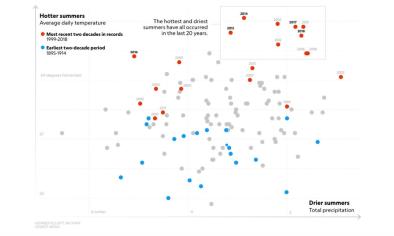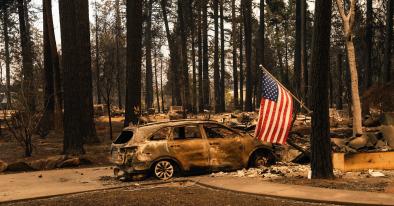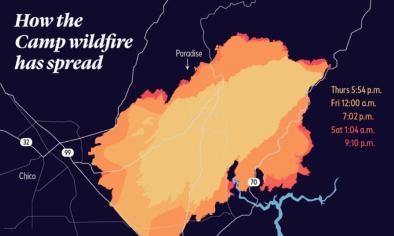'Undeniable link to climate change' in California's Carr fire, expert says

Rising temperatures linked to climate change are making the fires larger, more dangerous and more expensive to fight, experts have said.
...
Before the Carr Fire broke out near Sacramento, the area was facing its hottest July on record -- temperatures had been above average temps for months, as much as 10 degrees higher than normal.
ABC News Senior Meteorologist Rob Marciano said it was an exceedingly long heatwave and that the high temperatures could create more wind in the afternoon and evening that's partly why the Carr fire spread so rapidly.
"Even by July standards, this is an unusually long July heat wave with triple-digit heat in areas for three weeks straight. And the night that the fire went off, temperatures were well above 110 degrees. In cases like this, there's an undeniable link to climate change," Marciano said.
While rising temperatures may not spark a wildfire, the heat often make fires more likely and more severe. Droughts dry out trees and vegetation that becomes fuel for fires more likely to spread farther, faster.
Noah Diffenbaugh researches the connection between climate and extreme weather as a professor of Earth System Science at Stanford University. He said the longer fire season in California is related to climate change because global warming caused by greenhouse gas emissions has increased the average temperature by almost 2 degrees Fahrenheit.
"We're getting warmer and warmer conditions around the globe but certainly here in California and in the western United States we're getting earlier melting of snowpack," Diffenbaugh told ABC News' Brad Mielke on the "Start Here" podcast. "That means that when those warm conditions happen in the summer and fall all the vegetation is even more dried out and that means that when lightning strikes when a spark from a from a car or a campfire hits the ground that the vegetation is more dried out there's more fuel available."
...
The U.S. Forest Service has been warning of the increasing costs related to fighting these wildfires for years, saying that it had to borrow money from programs intended to prevent fires to pay for fire suppression. The U.S. Department of Agriculture, which includes the Forest Service, said that 2017 fire season cost more than $2 billion, making it the most expensive fire season on record.
A record-setting 129 million trees on 8.9 acres were dead at the end of 2017 because of the state's drought, according to the U.S. Forest Service and California fire and forestry agency.
Related Content





